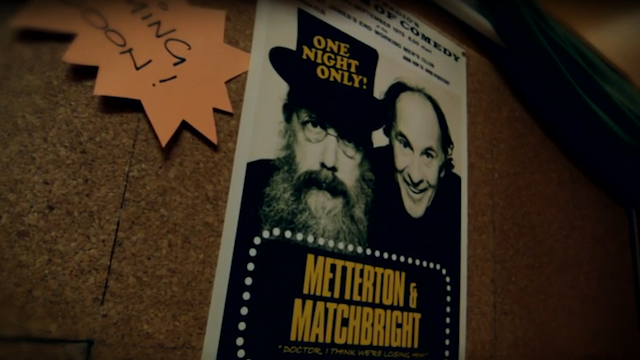Famed comic book author Alan Moore (Watchmen, From Hell, V For Vendetta) emerges from a creative hiatus via this rare film collaboration with commercial/music video director Mitch Jenkins. Moore’s script for Jimmy’s End is a portrait of the afterlife which reveals a dream-like truth to how people subconsciously face their end. Moore’s script and cameo are a treat for fans of his work, considering he has publicly denounced his film adaptations. Jenkins has expertly crafted a haunting glimpse into the world of those tortured by their desires.
Our story begins with an 18 minute prelude called Act of Faith. Faith Harrington makes a few phone calls then proceeds to dress up for a night out. During her ritual, she falls into a closet that guarantees her ticket into the Matchbright and Metterton Night Club.
This is where the film Jimmy’s End begins. Immediately, the audience is aware that this is a world set in the mind of the main character. Exaggerated film speed and a stretched soundtrack create a tilted environment. The protagonist, James Mitchum, jumps into the doorframe of a gentlemen’s club to escape the pounding rain. There, he interrupts a smoke break by one of the club’s dancers. She suggests that James go into the club to grab a drink while he’s waiting for the weather to pass. When James enters the club, he notices that everything is a bit removed from societal norms. Each guest looks as if they too have sought refuge in the club to escape a personal hell. James is disturbed by the sad and depressed atmosphere. His reactions are clues that his surroundings are displaced.
At a table next to the bar, the proprietor, Matchbright, buys James a drink. Matchbright is accompanied by Faith. Her off center stare and smudged makeup make James feel uncomfortable. Matchwright invites James to sit down and to stay for his show with Metterton. While they are exchanging pleasantries, James reveals a bit of his backstory and how he got to the club. After their conversation, Matchbright orders Faith to check on the dancers in another room. James politely agrees to escort her.
The discombobulated stage is home to violinists who sit with their instruments idol while a tape player does their job. Scatter couples lean back and forth to mimic dance moves. James asks Faith to dance, hoping to connect with her on some human level. At first, they begin to discuss honest feelings. After a moment, the fragile fabric of conversation unwinds into a cacophony of riddles. Eventually, Faith leaves James to complete her task. Alone, James stumbles upon several unsavory characters, including a capricious clown, who insist that he is headlining the show. Finally, Metterton (Moore) begins the performance. During his monologue, James succumbs to the cast as they escort him to center stage where the film reaches it’s conclusion.
Alan Moore and Mitch Jenkins have created a film that reflects the surrealist dreamscape of afterlife. Each lyrical dialogue reveals clues into characters motivations and purpose in this abstract world. The film feels like a glimpse into someone’s nightmare. All of the elements are grounded in reality with a few unsettling details meddling in the background of each frame. This haunting portrait is Moore’s spiritual interpretation of purgatory for those who have committed depraved acts during their lifetime. As a fan of Moore’s work, this was a rare privilege to see him in concert with a filmmaker. This project is the best interpretation of the tone his worlds currently reside. It’s my suggestion to watch the prelude Act of Faith before watching Jimmy’s End. The prelude will put some of the more surreal elements in context.

 Genevieve Okupniak
Genevieve Okupniak